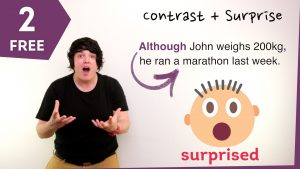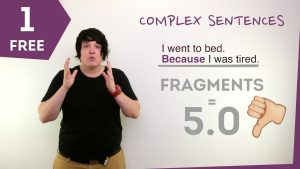We know that to get a high score in IELTS writing you need to be able to produce sentences that are error-free. Every year I mark literally thousands of IELTS writing scripts, and it is amazing how often I see the same mistakes again and again, no matter what the nationality of the writer. So, in today’s post, I want to challenge you to complete my IELTS grammar quiz to see if your current knowledge is up to the mark or not!
My IELTS Grammar Quiz
OK. Each of the following sentences / clauses contains AT LEAST one classic B2/C1 grammar mistake. I want you to look at each sentence, identify the problem and change the sentence so that it is correct. If you can’t find the error, don’t worry. I will explain all of the mistakes later in the lesson.
- While multinational companies provide employment opportunities, but they often cause local businesses to go bankrupt.
- One of the reason for the popularity of the cinema is that watching films on the big screen is more exciting.
- Not only advertising affects people’s spending habits, but it also has an impact on the types of products we desire.
- Problem of the crime is very common in the cities, and is one that government has to deal with in future.
- If the government spends more on promoting healthy lifestyles, it would encourage people to change their habits and to become more active.
- Many people today are not having a regular rest, which means that they are being stressed.
- By selling my car resulted in me being able to buy a computer.
- Every member of community should be given a chance to have their basic right of learning, it’s the government’s job to provide people with this opportunity.
- Overall, it can clearly be seen that the total amount of electric production was skyrocketed in Australia and France in 20 years.
- Although children are used to studying when they finish school.
OK, how did you get on? Do you think you found all the errors? I would say that if you found 7 or more, you have done a great job! So, let’s go through each item individually so that I can show you what the mistake is and how you can avoid it from now on.
1. Contrast sentences
I would say that of all the different types of complex sentences, those that show contrast are the ones that I see the most mistakes with. Here we have a classic error. The student has started the sentence with “although” to show contrast, which is great. However, they then destroy their sentence by adding “but” in the middle! Now we have TWO words joining only TWO clauses, which is a massive error 🙅♂️. All we have to do to fix this mistake, is to remove the “but”
- Although multinational companies provide employment opportunities, but they often cause local businesses to go bankrupt. ❌
- Although multinational companies provide employment opportunities, they often cause local businesses to go bankrupt. ✅

Another common error I see with contrast sentences is using a comma after “whereas”. This shows a fundamental misunderstanding of this type of word that “whereas” is – it is a SUBORDINATOR not a TRANSITIONAL SIGNAL. If you got this question wrong or don’t know how to use “whereas” (or while or despite or yet), then you can watch my free Three Types of Contrast video lesson to find out more.
2. Subject / Verb Agreement
No matter how good your level, you are probably still in danger of writing sentences that contain an agreement error. In this sentence, I included TWO common mistakes:
- When we start a clause that starts with “one”, we have to use a PLURAL noun after “of the”
- When we start a clause with a gerund, we have to use a SINGULAR verb – so even though we have “films” just before the verb, we still need the singular “is”
- One of the reason for the popularity of the cinema is that watching films on a high screen are more exciting. ❌
- One of the reasons why people enjoy going to the cinema is that watching films is more interesting there. ✅
If either of these mistakes surprised you, then you can read about other strange subject/verb agreement rules in this blog post. And if you found both of these mistakes, pat yourself on the back, take a bow, and look smug 🤩!
Listen to two IELTS experts discuss three of the grammar problems in this post on the My IELTS Classroom podcast. Click on the player to listen.
3. Not using inversion after “Not only”
Using “not only” in a sentence is a GREAT way to add emphasis to your argument. However, to get maximum points from the examiner, you must use it correctly. The easiest way to use “not only” is to put it AFTER THE SUBJECT of the first clause:
Advertising not only affects people’s spending habits, but it also has an impact on the types of products we desire. ✅
This is great, but it is really only band 6.0. To move up to a 7.0, we need to move the “not only” to the BEGINNING of the sentence. However, when we do this, we have to use something called “inversion”. I have a 30 minute lesson on different types of inversion in my grammar course.
However, very basically, it means that what comes after “not only” must look like a question. In our example sentence, the student failed to do this. So, how can we correct this error? Well, because the first clause was in the present simple, we need to make a present simple question, which means adding “does”.
- Not only advertising affects people’s spending habits, but it also has an impact on the types of products we desire. ❌
- Not only does advertising affect people’s spending habits, it also has an impact on the types of products we desire. ✅
If this looks complicated, don’t worry, it is rather simple once you have some practice. And, if you still find it difficult, you don’t have to use “not only” at the beginning of a sentence! It is better to have an error-free easy sentence than to make a mistake. However, if you can master this rule, it is a great way to push your GRA score up to a 7.0+.
4. Articles
Articles, articles, articles! If I had £1 for every articles mistake I’ve fixed in an essay, I would have retired many years ago! In this sentence, there were FOUR mistakes!!!!
- The student forgot the rule “the + noun + of + noun” – this is one of the most common article mistakes, but it is also one of the easiest to remember and fix (the problem of crime)
- When we talk in general, we just use an uncountable noun or a plural noun (crime / cities)
- Government ALWAYS needs the definite article (the government) unless you are talking about ALL governments, in which case you can use the plural.
- X Problem of the crime is very common in the cities, and is one that X government has to deal with in future. ❌
- The problem of Ø crime is very common in Ø cities, and is one that the government has to deal with in future. ✅
Articles are probably going to be a lifetime struggle for most students, but if you are aiming for an 8.0, you really do want to minimise your errors to two or three in the whole essay. Luckily, my lesson on articles is one of the free videos at the start of the grammar course.

5. Mixing the 1st and 2nd conditionals
Conditional sentences are very useful to explain arguments in more detail or to add an example. However, you have to make sure that when you use a conditional sentence, you don’t mix the first and second conditionals.
- First Conditional = If + present simple, will + infinitive = used for REAL or LIKELY situations
- Second Conditional = If + past simple, would + infinitive = used for UNLIKELY or HYPOTHETICAL situations
In our quiz, the student used the FIRST conditional in the first clause, but the SECOND conditional in the second. And, do you know what type of conditional this makes? A TERRIBLE ONE!!! 😂 🤣
If the government spends more on promoting healthy lifestyles, it would encourage people to change their habits and to become more active..❌
So, we can fix this in two ways. We can change the “would” to “will” to make a 1st conditional OR we can change the past simple to the present simple to make a 2nd conditional. Both are good, the only difference is how likely YOU think it is that the government will spend this money .
- If the government spends more on promoting healthy lifestyles, it will encourage people to change their habits and to become more active. = 1st conditional (likely) ✅
- If the government spent more on promoting healthy lifestyles, it would encourage people to change their habits and to become more active. = 2nd conditional (unlikely) ✅
6. Using the present continuous to describe a FACT
Now, I have to admit that this problem is often associated with your first language (I’m looking at you my lovely Indian and Pakistani students!) In English, when we are giving a fact or a general truth, we should use the PRESENT SIMPLE not the present continuous. In this sentence, we are talking about the fact that ALL people today don’t have enough rest, so the present simple is necessary here:
- Many people today are not having a regular rest, which means that they are being stressed. ❌
- Many people today do not have a regular rest, which means that they are stressed. ✅
There are two tricks to remembering this rule. First of all you can ask yourself these simple questions:
- Is this always true?
- Does this always happen
- Is this a fact?
If the answer is yes to any or all of these questions, you need the present simple. But, if you are still unsure, then my advice is to always use the present simple! The present continuous is only used to show a changing trend, and that is rarely needed in an IELTS essay (except for in, perhaps, the introduction), so the present simple is usually the safest bet!
7. Adding “for” before a gerund when it is not necessary
This is a less common error, but it is one that pops up every week and can hurt a high-level student. You mustn’t add “by” before a gerund unless you are giving a result. Very simply, by + gerund = because I did this. In other words, the “by” JOINS the sentences so we don’t need anything else to connect them). Look at these sentences:
- By selling my car resulted in me being able to buy a computer = BAD (“by + gerund” and “resulted in” BOTH join the sentence and show result- you only need ONE!) ❌
- Selling my car resulted in me being able to buy a computer” = GOOD (only “resulted in” joins the sentence and shows result) ✅
- By selling my car, I could afford to buy a computer” = GOOD (only “by + gerund” joins the sentence and shows result) ✅
Again, my advice would be if you are not 100% sure if the “by” is correct, don’t use it! Most of the time all you need is the gerund to start the sentence (again, Gerunds and Infinitives are included in my grammar course)
8. Using Magic commas / Writing Run-on sentences
Oh boy, oh boy, oh boy. I don’t care if you call them “magic commas” or “run-on sentences” or “comma-splices”, the simple fact is that YOU CANNOT USE A COMMMA TO JOIN TWO CLAUSES!!! Commas do not contain magic powers! If you want to use two clauses in one sentence, you have to add a word to “glue” those clauses together
- Every member of community should be given a chance to have their basic right of learning, it’s the government’s job to provide people with this opportunity. ❌
- Every member of community should be given a chance to have their basic right of learning, so it’s the government’s job to provide people with this opportunity. ✅
Here, I have added “so” to make a compound sentence, but you can also add words to make complex sentences. This is one of the most basic rules of academic writing, and if you make this mistake, you are going to find it hard to get a 7.0+ in the exam.
If you didn’t know this rule, you absolutely have to stop reading this and go and complete my free Introduction to Complex Sentences lesson. I’m serious, why are you still here? GO GO GO!

9. Unnecessary passive voice
People get a bit obsessed about the passive in essays. They have this strange belief that you have to use the passive to get a high score. This is absolutely not true. Like any sentence structure, the passive is just there to help you when you need it, but it is not compulsory. In general, we will need it to:
- change the focus of a sentence
- remove a subject that is obvious
- remove a subject that is not known
However, sometimes students are so eager to use the passive tense, that they use it in sentences where the passive is NOT needed. This is very common with verbs that describe change like skyrocket, increase, decrease, etc. What skyrocketed in this sentence? The total amount of electric production! And because the subject is the same as the agent, we need an ACTIVE sentence here!
- Overall, it can clearly be seen that the total amount of electric production was skyrocketed in Australia and France in 20 years.❌
- Overall, it can clearly be seen that the total amount of electric production skyrocketed in Australia and France in 20 years. ✅
Guess what? You can learn how to write passives correctly in my grammar course (and how to use them to distance to show that something is NOT your opinion)
10. Writing a fragment
OK. I saved the worst until last. If there is one mistake that you have to avoid marking, it is writing a FRAGMENT. Fragments are literally half a sentence, and they are the quickest way to reduce your GRA score from a 7.0 to a 6.0. When you start a sentence with a subordinator (like when or although or because or if),
you must add a second clause to complete the sentence.
And, in general, you always need ONE extra clause for every joining word. In this sentence, we have TWO joining words but only two clauses instead of three. This is a fragment. To finish this sentence, we have to add another clause:
- Although children are used to studying when they finish school. = fragment ❌
- Although children are used to studying when they finish school, they can still benefit from a year off before university. ✅
Again, if you don’t know this rule, please go and watch my free Introduction to Complex Sentences lesson, where I discuss this in great detail! You really can’t enter the exam room if you don’t know this basic principle.
So, that was my IELTS Grammar Quiz. I hope that you enjoyed challenging yourself and found the lesson useful. If you struggled, don’t worry. These questions are aimed at students who are B2/C1 in level i.e. those who need a 7.0 in the exam. If you need a lower score, try to focus your preparation on making nice simple complex sentences, like using “because” or a first conditional. Good luck🚀
Recent comments